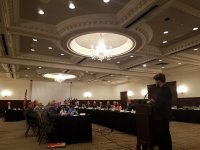ORSANCO Makes Standards Voluntary

On June 6, the current standards set by the Ohio River Valley Sanitation Commission (ORSANCO) for monitoring water quality in the Ohio River became voluntary. Only two of the commissioners representing eight member states and the federal government voted against the measure. (You can watch the meeting here and here).
The reasoning behind the change, according to commissioners, was the minimal number of staff members and the overwhelming amount of work pouring in. Some felt the current standards overlap with state and federal environmental protection agency rules.
However, it was pointed out by many residents of these member states that not all of ORSANCO’s standards are covered by other agencies and, in fact, many environmental regulations are being rolled back by the Trump administration. For example, ORSANCO monitors more than 180 toxins and pollutants not covered by state or EPA regulations.
States along the Ohio River must work in coalition to ensure the health of all who live along its banks. If one or two states ignore pollution controls, it can cause harm to all who live down river.
Activists from both Kentucky and Ohio arrived at the Radisson Hotel Riverfront in Covington the morning of June 6 to oppose the change. About a dozen spoke out at the hearing to add to the abundance of online comments received. The majority of people commenting at the hearing strongly opposed the change.
More regulations, not less, are needed at a time when the EPA and state agencies are being deregulated, they said. Sierra Club representatives and others pointed to the additional need for numeric standards to regulate nutrient pollutants, such as nitrogen and phosphorus.
Also of concern were proposed fracking water holding facilities and plants designed to use fracking byproducts to manufacture plastics in and around the river in Ohio, Pennsylvania and West Virginia. According to Scientific American, tiny particles of plastic, known as microplastics, are showing up in fish and even in beer that uses water from polluted sources. These structures are already being built and now with voluntary regulations it will continue at an even faster rate.
Many also spoke on behalf of their children and grandchildren who will be most impacted by these changes, and how they are fighting to ensure a better future for them and generations to come.
Cheryl Jon-Cox who spoke on behalf of the Sierra Club stated:
"The Ohio chapter has 30,000 members and over 100,000 supporters … and we are all unified in our message that mandatory standards must remain in place across the basin in order to protect the five million people who rely on the Ohio River for drinking water."
Joshua, a Kentucky teacher, not only pleaded with commissioners to keep regulations mandatory but also said it’s important to improve on the guidelines already set:
"You are not only necessary, but you need to improve your role. We have been in violation of the Clean Water Act, in specific our sewer district. We have a combined sewer overflow system, meaning every time it rains the gear in our water treatment is overflowed so all of our raw sewage is going into the Ohio River. It used to be 14 million gallons a year, now it's eight so it has improved but you are highly necessary, I assure you."
Doug Conroe, one of the two ORSANCO commissioners who voted against the proposal, made the following statement:
“I see less and less in terms of environmental, governmental proactivity," he said. "I see status quo. I see sincere and caring environmental officials who are hamstrung by fiscal cutbacks and staff reductions, along with facing heavy pressures from the regulated community to lighten up … I believe having meaningful, river-wide required standards is an important tool to include in our toolbox."
ORSANCO now must set new policies and procedures by their October meeting in Virginia. The meeting is set for October 8 through 10.
Recent News
Kentucky’s past legislative session showed alarming trend toward government secrecy
Churchill Downs takes more than it gives. That's why the Kentucky Derby is a no-go for me
‘We must never forget.’ Kentucky town installs markers for lynching victims.
Featured Posts
Protecting the Earth
TJC Rolling Out The Vote Tour – a KFTC Reflection Essay
KFTC Voter Empowerment Contractor Reflection Essay
Archives
- Home
- |
- Sitemap
- |
- Get Involved
- |
- Privacy Policy
- |
- Press
- |
- About
- |
- Bill Tracker
- |
- Contact
- |
- Links
- |
- RSS

